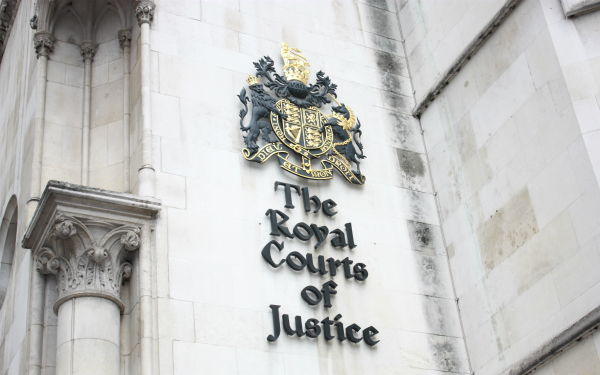
The Home Office has been housing unaccompanied asylum-seeking children in hotels unlawfully since December 2021, the High Court has ruled.
The court also judged that Kent County Council has acted unlawfully since 2021 in refusing to accept all unaccompanied children into its care when notified of their arrival in the county, in a stinging judgment issued last week.
Following the ruling, the judge, Mr Justice Chamberlain, quashed an unpublished 2021 agreement between the Home Office and Kent allowing the council to look after a capped number of children arriving in the county.
He also ordered the Home Office and Kent to jointly pay court costs – valued at £50,000 – to ECPAT UK. The charity had brought a judicial review claim that Kent had breached its Children Act 1989 duties in not accommodating asylum-seeking children in its area and that the Home Office was housing children without the power to do so outside of an emergency.
Last week’s ruling also considered other issues common to ECPAT’s challenge and separate judicial review claims brought against the Home Office by Kent and Brighton & Hove council, among five authorities with hotels in their areas. Other aspects of the challenges will be considered in subsequent hearings.
Widespread concerns over use of hotels
The ruling follows widespread concerns about the risks to children placed in hotels, in the light of hundreds going missing, a critical inspection report that raised safeguarding issues and doubts over who was responsible for their care and welfare under the Children Act 1989.
This question was resolved in a judgment in June, which found that the local authority where the relevant hotel was located was responsible. However, in its evidence to the latest case, Brighton said it “simply [could not] discharge its statutory duties if the [home secretary] continues to operate this unlawful scheme”, and that the hotel in its area was “unsafe”.
Since the Home Office started using hotels in July 2021, they have housed more than 5,400 children – 32% of whom were under 16 – in them. As of 17 July 2023, 218 children were in hotels, and the Home Office told the court it was anticipating that more needed to be accommodated in the coming days and weeks.
It initiated the hotels policy a month after Kent – in whose area the vast majority of unaccompanied children arrive – announced it would stop taking any into its care, after reaching “breaking point”.
Private agreement between Kent and Home Office
Kent resumed taking unaccompanied children in September 2021, but the court found that this was under the terms of a private agreement with the Home Office, the “Kent protocol” , which set a cap of 466 on the number the authority would be caring for at any given time.
Under the agreement, the Home Office also funded the authority – to the tune of £4.37m in 2021-22 – to set up a “reception and safe care service” (RSCS). This was designed to look after up to 120 children, moved from Home Office hotels, pending their transfer to another council under the National Transfer Scheme (NTS).
The NTS – which, at the time, was voluntary but became mandatory in December 2021 – is designed to even out responsibility for accommodating unaccompanied children by transferring them from councils with numbers exceeding 0.1% of their child population to those below that threshold.
Universal agreement that Kent ‘breached section 20’
Mr Justice Chamberlain found that all parties to the case – including Kent – agreed, correctly ,that the authority had breached its duties under section 20 of the Children Act 1989, by not accommodating all unaccompanied children that the Home Office notified it about.
Section 20 requires councils to accommodate children in need in their areas who are lost, abandoned or without anyone with parental responsibility, and the judge said this duty was “absolute” and applied “irrespective of the resources of the local authority”.
He also found that Kent had chosen to treat some unaccompanied children less favourably than other children based on their immigration status. This violated “a fundamental aspect” of the Children Act 1989, which was that councils’ duties applied “to all children, irrespective of immigration status, on the basis of need alone”.
For the same reason, the judge found the Kent protocol illegal, as it was “premised upon a continuing breach of Kent CC’s duties” and that the responsibility for this unlawfulness lay as much with the home secretary for agreeing it, as with the authority.
Legality of hotel placements
The ruling said that, while the home secretary had no express power in law to accommodate unaccompanied children, she could do so in an emergency, for short periods, to avoid breaches of their rights to life and not to be treated inhumanely, under the European Convention on Human Rights.
However, Mr Justice Chamberlain said the power could not be used “systematically or routinely in circumstances where it is intended, or functions in practice, as a substitute for local authority care”.
He assessed that its use had become routine and systematic by December 2021, when the Home Office amended its NTS protocol to allow for children to be transferred who were “not in the care of a local authority”.
The judge found that the government had other options available to it to avoid a breach of the law, including directing Kent to fulfil its statutory duties under the Children Act or providing more funding to it or other authorities so they could accommodate the children concerned.
The judgment comes in the wake of the passage of the government’s Illegal Migration Act 2023, which legislates for the Home Office to accommodate unaccompanied children; however, as this provision is not yet in force, this was not relevant to the case.
Authority ‘must do utmost to accommodate children’
In its order following the judgment, the court quashed the Kent protocol as of 18 August 2023 and ordered the authority to, immediately, take all possible steps to accommodate unaccompanied children arriving in the county and only refuse this as a “last resort”.
As part of this, the authority must take all possible steps to increase its care capacity, including through reallocating its resources, seeking additional government funding and working with other councils to source placements.
Mr Justice Chamberlain also ordered the Home Office to, immediately, ensure all children in hotels were transferred to a local authority within five days, with the same time limit applying to new arrivals.
Payments resume for councils taking children from hotels
Following the judgment, the Home Office confirmed it had resumed paying local authorities to take children from hotels, as it did from August 2022 to February 2023. when payments were initially set at £6,000 per child, rising to £15,000 from December 2022.
This appears to have helped increased the number of transfers out of hotels, according to Home Office data.
| Transfers from Home Office facilities | Transfers between councils | |
| April to June 2022 | 293 | 394 |
| July to September 2022 | 695 | 278 |
| October to December 2022 | 922 | 116 |
| January to March 2023 | 407 | 272 |
The department has reinstated the £6,000 payment – which applies when a council accepts a child into its care from a hotel within five days of a notification to do so – and said this would apply throughout 2023-24.
Government ‘had no option but to use hotels’
A Home Office spokesperson said: “We have always maintained that the best place for unaccompanied children to be accommodated is within a local authority.
“However, due to the unsustainable rise in illegal Channel crossings, the government has had no option but to accommodate young people in hotels on a temporary basis while placements with local authorities are urgently found.
“In light of today’s judgment, we will continue to work with Kent County Council and local authorities across the UK to ensure suitable local authority placements are provided for unaccompanied children, in line with their duties.”
For Kent, council leader Roger Gough said that the authority accepted the ruling. But he that it would not be able to support new arrivals in Dover while also making sure children in its care remained safe without a “properly functioning NTS”.
Transfer scheme ‘not working’
“Kent has long since argued that other local authorities must accept their fair share of these vulnerable children into their care within the specified timescales and the Home Office must be prepared to use its powers to force recalcitrant local authorities to participate in the Scheme. Sadly, the NTS is currently not operated in such a way to achieve this and this results in a small number of local authorities being overwhelmed and ultimately affecting a whole range of vulnerable children.”
Gough pointed out that the High Court stated that “Kent should not be criticised for refusing to operate an unsafe service” and that it expected the Home Office to work with the coastal authority to return to court with a resolution to the issues with the NTS very soon.
Brighton’s leader Bella Sankey welcomed the judgment, adding: “As a result of this policy, a dozen classrooms of children – including some of the most traumatised and vulnerable children in the world – have gone missing and, sickeningly for us, 50 children are still missing from the hotel used in Brighton and Hove.”
Echoing Gough, she said that home secretary Suella Braverman must now “urgently enforce [the NTS] so that the hotels can be emptied and all local authorities can play their part in safeguarding children”.
‘A child protection scandal’ – charity
Giving its response to the case, ECPAT UK chief executive Patricia Durr said: “This judgment powerfully reaffirms the primacy of the Children Act 1989 and our child welfare statutory framework which does not allow for children to treated differently because of their immigration status.
“It remains a child protection scandal that so many of the most vulnerable children remain missing at risk of significant harm as a consequence of these unlawful actions by the Secretary of State and Kent County Council.”
Association of Directors of Children’s Services John Pearce said councils’ ability to fulfil its duties to accommodate unaccompanied children was “limited by a lack of adequate funding and a national shortage of placements”.
Last month, Pearce criticised the Home Office for treating children it was accommodating as “spontaneous arrivals” into the local authorities in which its hotels were based, placing pressure on the councils’ social work teams in relation to age assessments.
Urging government support to tackle the lack of placements, as well as their increasing cost, he said: “Now is the time for a real step change towards a more sustainable system, one that is child-centred and developed in partnership with local authorities and our partner agencies.”





 Assistive technology and dementia: practice tips
Assistive technology and dementia: practice tips  A trauma-informed approach to social work: practice tips
A trauma-informed approach to social work: practice tips 




 Find out how to develop your emotional resilience with our free downloadable guide
Find out how to develop your emotional resilience with our free downloadable guide  Develop your social work career with Community Care’s Careers and Training Guide
Develop your social work career with Community Care’s Careers and Training Guide  ‘Dear Sajid Javid: please end the inappropriate detention of autistic people and those with learning disabilities’
‘Dear Sajid Javid: please end the inappropriate detention of autistic people and those with learning disabilities’ Ofsted calls for power to scrutinise children’s home groups
Ofsted calls for power to scrutinise children’s home groups Seven in eight commissioners paying below ‘minimum rate for home care’
Seven in eight commissioners paying below ‘minimum rate for home care’
 Facebook
Facebook X
X LinkedIn
LinkedIn Instagram
Instagram
Comments are closed.